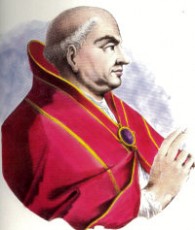Catholic Blesseds, Saints, Solemnities & Holy Days

Saint Martin I
Feast Day: April 13
One of his first official acts was to summon the Lateran Council of 649 to deal with the Monothelites, whom the Church considered heretical. The Council met in the Church of St. John Lateran, and was attended by 105 Bishops. In more than twenty canons, they condemned Monothelitism, its authors, and the writings by which Monothelitism had been promulgated. In this condemnation – individuals were singled out for their errors. Pope Martin was very energetic in publishing the decrees of the Lateran Council of 649 in an Encyclical, and Constans replied by sending his Governor in Italy to arrest the Pope should he persist in this line of conduct and send Martin as a Prisoner to Rome of Constantinople.
These orders were found impossible to carry out for a considerable amount of time, but finally, Martin was arrested in the Lateran on June 17, 653, along with Maximus the Confessor. He was hurried out Rome and was taken to Constantinople. After suffering an exhausting imprisonment and many alleged public indignities, he was ultimately banished to Chersonesos, a present day city in southern Ukraine. He arrived there on May 15, 655 and died on September 16th of that same year.





